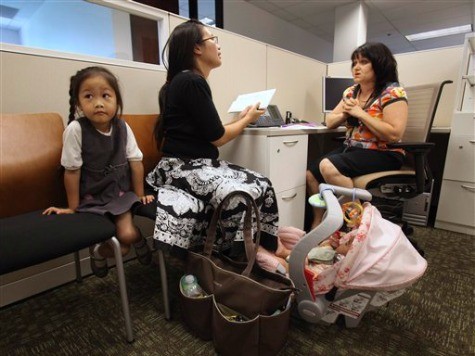
While President Obama has asserted his new healthcare reform law would finally cover low-income Americans without health insurance, an economist argues the law will still leave millions without coverage and discourage “strong and stable families.”
Former Department of Labor economist and current Manhattan Institute fellow Diana Furchtgott Roth wrote in a Washington Examiner op-ed that the Congressional Budget Office (CBO) projects that the number of uninsured will remain at about 30 million from 2016 and beyond, down from 55 million people today.
Roth stated that a primary reason for such a large number left uninsured is that millions of low-income Americans will not be able to get subsidies to purchase health insurance through the state exchanges.
“If they are married to someone who has affordable single-family coverage from an employer–coverage that the worker is obligated to accept–they will not be eligible for premium subsidies on the exchanges,” Roth wrote on Wednesday.
Without subsidies to purchase health insurance, family insurance plans will cost approximately $20,000 annually, in after-tax dollars, by 2016.
Anyone who is under 400% of the poverty line–which is currently $94,000 for a family of four–qualifies for a subsidy, unless a family member has employer-provided insurance.
Roth stated that while this “family glitch” continues to be problematic and remains unaddressed by Congress, it is actually not an “error” but a purposeful effort to keep costs down:
Early drafts of the Affordable Care Act in the summer of 2009 required employers to offer affordable care to employees and their families, and prevented families from migrating to the exchanges.
When employers protested that this mandate would be too expensive, the requirement was changed to employees-only. But the provision preventing families from going to the exchanges stayed.
Allowing the rest of the family to get subsidized coverage on the exchange would have raised the cost of the law above the $1 trillion threshold, possibly dooming the bill to failure.
“The intentional exclusion of family members from coverage under subsidized insurance through the exchanges meant that the Act was scored as reducing the deficit, rather than increasing it,” American Enterprise Institute economist Joseph Antos told Roth. “That was the key to passage among fiscally-conservative Democrats.”
Roth noted that, in a perverse sense, low-income families would only be able to get subsidized insurance if the parents divorced. Consequently, some individuals may postpone marriage, yet another way in which the federal government is discouraging “strong and stable families.”
“Married workers may rationally prefer to work for firms that do not offer health insurance,” Roth wrote. “In that way, they can qualify to purchase family coverage through the exchange, and get a subsidy.”
However, if the employer of a married worker with a family does offer health insurance coverage, he or she may opt instead to work for a firm that provides unaffordable coverage, in which case the employee would be able to decline it and purchase subsidized insurance for him and his family on the exchange. This option, of course, is dependent upon the ability to be hired by that firm.
The uninsured will continue to receive care at emergency rooms and community health centers, Roth observed, though this was the original problem that ObamaCare was supposed to solve.
According to Roth, the solution is to end the employer requirement to provide health insurance and allow everyone a refundable tax credit to purchase health insurance.
“Then, just as people choose their auto and home insurance policies, let them choose their health insurance plans,” Roth advised.

COMMENTS
Please let us know if you're having issues with commenting.